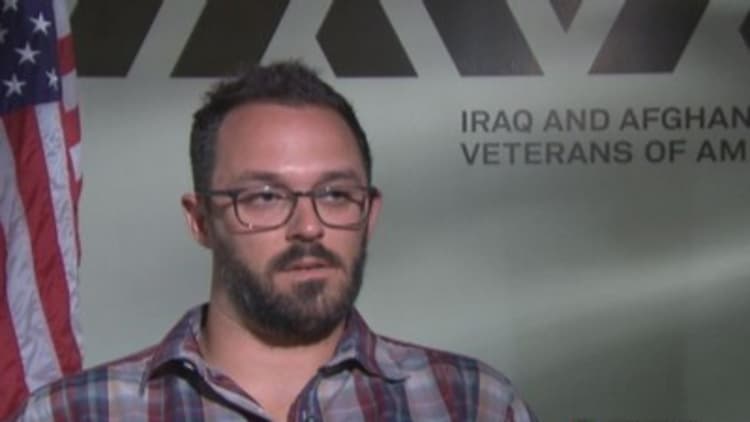Mlitary families face unique challenges when it comes to dealing with financial institutions. Something as simple as managing a checking account gets complicated when you're repeatedly deployed and frequently relocated.
Banks and credit unions that operate on military bases need to do a better job of serving their military customers, according to a new study by the Pew Charitable Trusts released on Tuesday.
"Safe financial products are essential for helping military families and the products that are offered by the banks and credit unions on bases are not necessarily providing that sort of protection," said Susan Weinstock, who directs consumer banking research at Pew.
Capt. Shelley Marshall, U.S. Navy (Ret.) is the vice president for communications at the Navy-Marine Corps Relief Society. Military families assumethat if a bank or credit union is on-base, it's been vetted by the military command to make sure it will take special care of them, Capt. Marshall told NBC News.
Read More Debt addiction: Red is not the new black

"For them not to have good business practices, ones that are in the best interests of the military families doing business on base, is very concerning to us," she said.
More from NBC News:
Want to save more for retirement? IRS bumps up limits for 2015
What billionaires really spend each month
Burdened with record amount of debt, graduates delay marriage
Checks and Balances, Stars and Stripes is Pew's first evaluation of military checking accounts. It found that some on-base financial institutions do a good job, but there was also significant room for improvement.
Here are the Pew study's major findings:
- Forty-two percent of the banks and 17 percent of the credit unions do not provide any disclosure information online. This makes it especially difficult for deployed service members to access information about the terms and conditions governing their accounts.
- The vast majority of on-base banks (89 percent) and credit unions (96 percent) do not protect their customers by automatically declining ATM withdrawals or point-of-sale debit card transactions that would overdraw the account. Financial Institutions are not required to do this, but Pew considers it a best practice, one that is now followed by several major commercial banks.
- More than half of the banks and three-quarters of the credit unions reorder at least some account transactions in a way that can create more overdrafts and higher overdraft fees. This reordering is not always disclosed in the account agreement.
The report also found that on-base credit unions, like those in the civilian world, tend to have lower fees than the banks:
- The median overdraft fee for the credit unions was $29, compared to $35 at the banks. But the researchers found that while all of the banks clearly disclosed those fees, 16 percent of the credit unions did not.
- Most banks and credit unions charge for transactions at out-of-network ATMs. Again, those fees are typically higher with a bank checking account (median fee $2.50) than with a credit union (median fee $1.00).
Is more regulation needed?
The Department of Defense (DOD) has the authority to regulate on-base financial institutions. The Pew report calls on DOD to do more to protect its servicemembers. It also wants the Consumer Financial Protection Bureau (CFPB) to take action.
"We urge the CFPB to write new rules that make all checking accounts, including those for the military, safer and more transparent and that will protect military account holders from harmful or hidden practices no matter where they bank."
Read More Nobel Economics Laureate: Why I back banking union
financial institutions respond
NBC News contacted the trade organizations that represent both banks and credit unions to get their response to the Pew report.
Nessa Feddis, a senior vice president with the American Bankers Association (ABA), said the Pew study does not really provide any new information. And she challenged the conclusions on overdraft fees.
"When it comes to overdrafts, people have a choice," Feddis said. "Every customer receives easy-to-understand disclosures about overdraft protection and if they sign up, they can opt out at any time."
And what about the difficulty Pew had in finding account information online? Feddis said servicemembers who need real-time information about their bank accounts can always use the "have a question" or "live chat" features offered by most financial institutions.
Jim Nussle, president and CEO of the Credit Union National Association (CUNA) said "there is always room for improvement," but in a statement, he said that any calls for additional regulation of credit unions "is premature, if not outright unwarranted."

